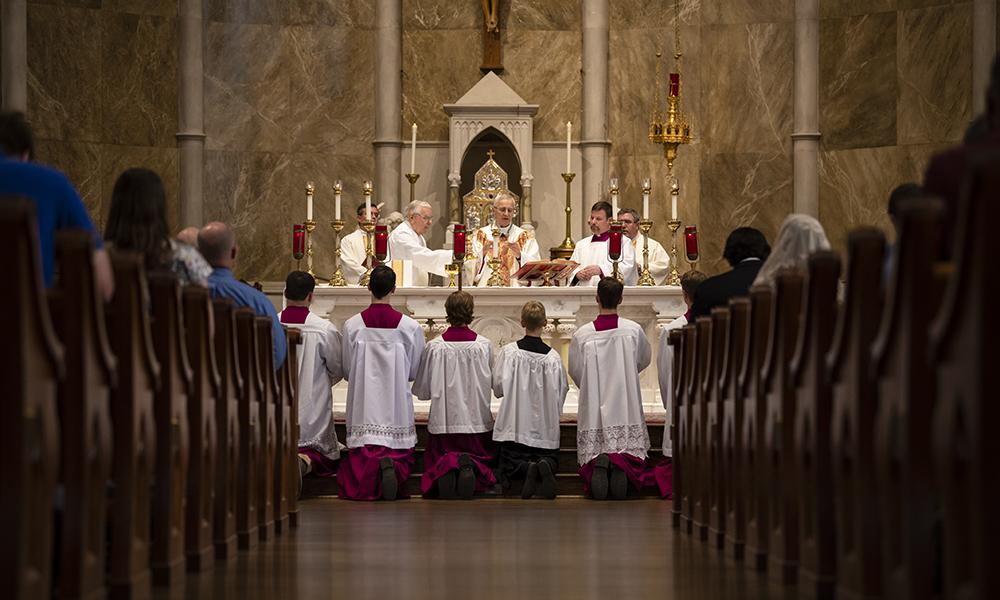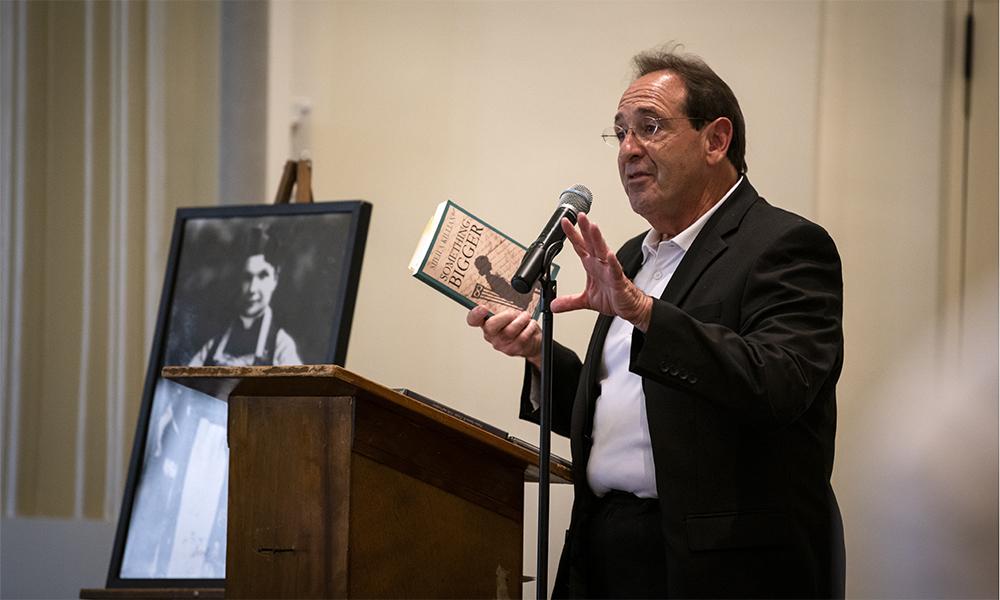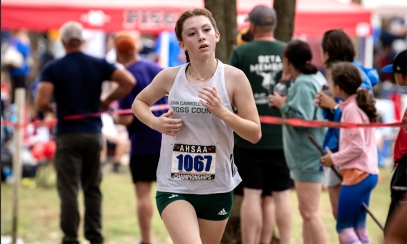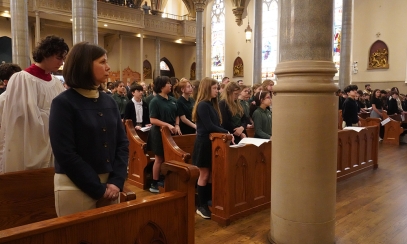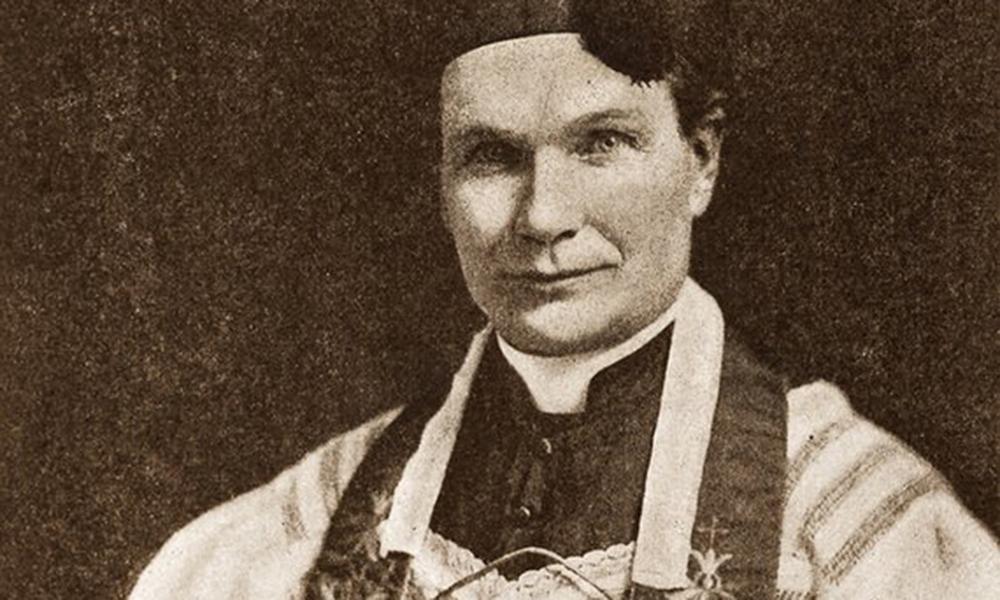
Remembering Father James Coyle
On Thursday, Aug. 11, Bishop Raica celebrated Mass at the Cathedral of St. Paul, marking the anniversary of Father James E. Coyle’s death. He was murdered for his faith on the same day in 1921. Father Kevin Bazzel, the diocesan Vicar General, was the homilist. Following the Mass, a reception and presentation was held in the Cathedral of St. Paul’s Life Center. The complete text of Father Bazzel's homily follows herein.
This past weekend, we celebrated the solemnity of the secondary patron of the Diocese of Birmingham, St. John Marie Vianney. He was born in the small town of Dardilly in France in 1786. It was a time of great trial for Catholics in France, as the rise of the Jacobins sought to de-Christianize the country, known as the eldest daughter of the Church.
The time for St. John Vianney to receive his First Holy Communion came during what was known in France as the Reign of Terror. Maximilien Robespierre had taken control of the country in 1793 and anti-Catholic and anti-clerical sentiments abounded. In fact, some 300,000 Catholics were arrested in the roughly 11 months of Robespierre’s reign, 17,000 of whom were executed. Needless to say, if the Church were to continue to provide for her people, she would have to do so discreetly.
Because of this, St. John Vianney received his First Holy Communion in a Mass, celebrated in secret, in his family’s home. Bales of hay were placed in front of the windows, lest any government partisans could see what was taking place inside. The women of the family were inside the home attending Mass; the men were outside laboring in the fields, in order to promote the ruse that the family was merely going about its business. This was the sad context of the saint’s first reception of his Lord in the Blessed Sacrament.
Despite, or perhaps because of, this tumultuous entrance into the practice of the Catholic faith, St. John Vianney went on to become one of the greatest preachers of the faith in all of Europe. Forged in the crucible of severe Catholic persecution, the profound depth of his love for God and the immense desire he had for the salvation of the people of God were the unmistakable hallmarks of everything St. John Vianney thought, did, or said.
Father James Coyle was born in Drum, Ireland on March 23, 1873. This was only 44 short years since Irish Catholics regained the full rights of citizenship in Ireland, after the revocation of the last of the anti-Catholic laws passed during the siege of Oliver Cromwell upon Ireland in the middle of the 17th century, a law which prohibited Catholics from having seats in Parliament.
After having been formed for the priesthood in Ireland, Father Coyle was sent to the-then Diocese of Mobile in 1896. He was assigned as pastor of the parish of St. Paul in the young city of Birmingham in 1904. Regretfully at that time, through groups such as the Ku Klux Klan and the True Americans, anti-Catholic sentiment grew alongside the increasing Catholic flock. Civil laws had been passed which sought to persecute the Catholic Church due to gravely flawed understanding of her mission.
These included the well-known Convent Inspection laws, which permitted government officials to raid religious houses in order to inspect for the presence of weapons. It was believed that Catholics were stockpiling munitions in order to be prepared for the moment that the Roman Pontiff would call upon them to rise up and overthrow the government so that the pope could assume control of the country. In the end, the sentiments of the day would cause Father Coyle to lose his life, but the fear of this never kept him from his tireless priestly labors.
Father Coyle was the most ardent defender of the Catholic faith in Birmingham, writing frequent columns for the Birmingham newspaper in attempts to dispel false understandings of the teachings of the Church and proclaiming the desire of Catholic citizens to promote the common good of society. These articles also served to build up the faithful in Birmingham, offering them the words they needed to defend their own faith. Indeed, his homilies often extolled the virtue of receiving Holy Communion frequently and of fostering a devotion to the Blessed Mother – similar themes to which St. John Vianney also returned often.
The juxtaposition of these two men provides us an invaluable lesson for our time. We gather in this Church today without any attempt of external restraint being placed upon us by the government, or by anyone else for that matter. We approach this altar to receive the Blessed Sacrament without any fear whatsoever of being arrested, much less executed. Catholics are found in all walks of life, in every part of society, not seeking a human kingdom but contributing to the building up of the Kingdom of God here on earth.
And yet, regretfully, sometimes we find ourselves internally restrained from fully, freely, and joyfully living and sharing our faith with those around us. We allow the shackles of self-consciousness, doubt, or fear of the inconsequential reprisal of rejection by society to keep us from fulfilling the command given by our Lord to all the faithful to preach the Good News of salvation in Him.
And we do this, I believe, because we lose sight of the beauty of the simple and consistent message preached by both St. John Vianney and Father Coyle – the unsurpassable worth of the Blessed Sacrament; the need to forgive others while seeking out our own forgiveness in the sacrament of Confession; and the great need we have of the powerful intercession of the Blessed Virgin Mary.
Perhaps today, as we commemorate the 101st anniversary of the death of Father Coyle, in the midst of this time of Eucharistic Revival, while our diocese also seeks to assist those men among us who are called to the priesthood to hear and answer that call, we ask for the intercession of the Blessed Virgin Mary and St. John Vianney to imitate their lives. In doing so, we will find the grace we need to proclaim Christ, in season and out of season, to increase the members of the Kingdom of God here on earth, and to ensure our place in the Kingdom of Heaven.
For more information about the life and death of Father Coyle, please visit fathercoyle.org.

